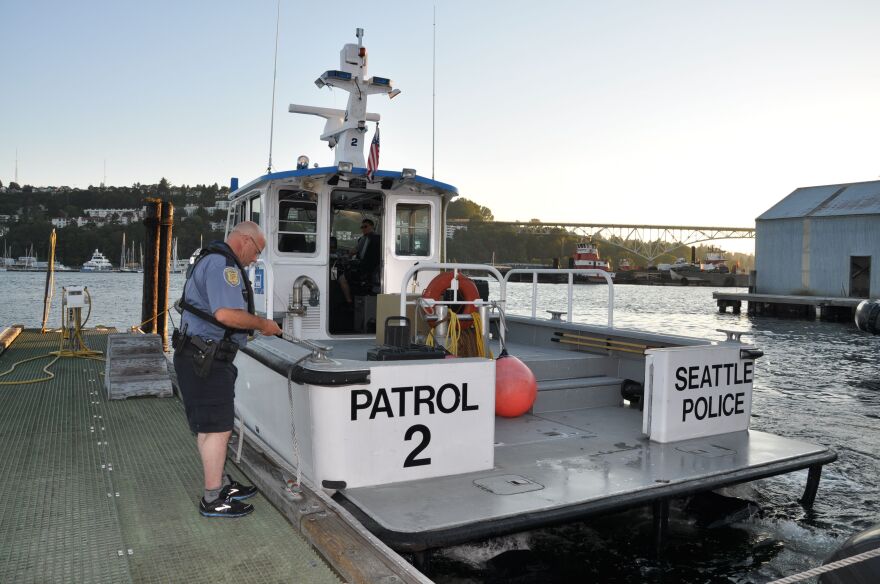On the weekends, a lot of boaters hit the water which means a lot of drinking off of dry land. But boating under the influence laws are about to get a lot tougher. This Sunday, a new state law will take effect that will make drunk boating as punishable as drunk driving.
A typical Friday night on Lake Union means endless amounts of kayakers, sailboats, and motorboats are traversing the lake. Sea planes are taking off and landing constantly. This is one of the most popular lakes in the state, which keeps Seattle Harbor Patrol plenty busy.
[asset-images[{"caption": "Based near Gas Works Park, the Harbor Patrol Unit is the only one of its kind in the region to operate 24 hours a day. ", "fid": "5043", "style": "card_280", "uri": "public://201307/news072513boat2.jpg", "attribution": "Credit KUOW Photo/Meghan Walker"}]]Officers David Joseph Sylvester and Richard Groves work 24-hour shifts patrolling the lake, spending about 12 hours a day motoring around. At night, they’re based at a station at the north end of Lake Union next to Gas Works Park. The Harbor Patrol Unit's area includes Lake Union, Lake Washington and the Puget Sound. It is the only 24-hour marine patrol unit in the region.
While out patrolling the lake, Groves received a report that there’s a boat with expired tabs. After they rafted up next to the 30-foot motorboat, Sylvester noticed that the two men on board had open beers on deck.
“How much have you had to drink today?” he asked the driver. The man showed Sylvester his nearly-empty beer bottle, and said he’s only had one. “Just asking, but you don’t appear to be impaired to me,” Sylvester said, letting him off the hook.
This is a normal interaction on the water according to Sylvester, especially when the weather is nice. He said that while it’s illegal to have an open container in a car, “On a boat it’s not quite the same. As you look around the lake you’ll see many luxury yachts in the 40-60 foot range, and they actually come with a bar already installed on their boat; so it’s pretty common for people to have a drink or two while they’re out on the water. What’s required is that they don’t allow that drinking to impair the safe operation of that boat.”
As the law currently stands, BUI laws are pretty minimal. Boaters can even refuse to take a sobriety test. That will change when the new law kicks in on July 28. On top of that, if you’re caught impaired while driving a boat, the consequence can be much more serious. “We bumped it from a $250 slap on the wrist to $5,000 and a year in jail,” Sylvester said.
While the new laws make it more difficult to get away with having one too many out on the water, Sylvester is realistic about the boating culture. “Wherever we get boaters that are clustering together and in good weather, you’re going to have people drinking beers. Essentially, we want people to act responsibly.”
There’s another change coming to Seattle’s waterways: noise control. Seattle City Council just passed a noise ordinance that makes it illegal to play music on a boat if it can be heard from 300 feet away. That law goes into effect early next month.

